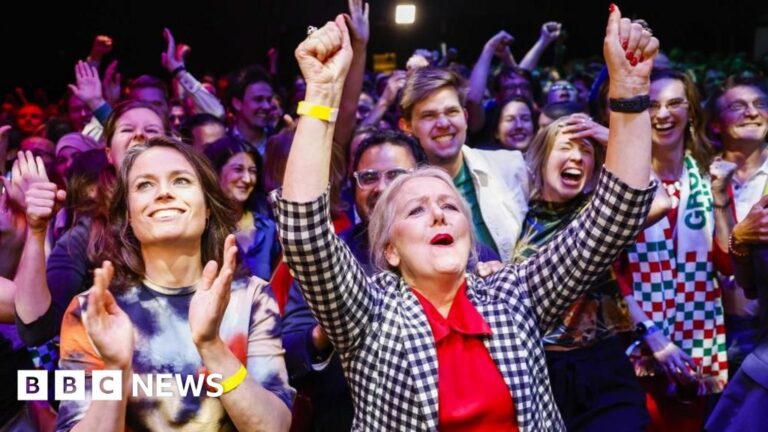Image source, Sem van der Wal/EPA-EFE/REX/Shutterstock
- author, Paul Kirby
- role, Brussels
Dutch voters have begun four days of voting across the European Union, with exit polls suggesting a close race between the left-wing/Greens coalition and the party of anti-Islam populist Geert Wilders.
Right-wing and far-right parties were widely expected to gain significant influence in many of the EU’s 27 member states, and this appears to have been somewhat borne out in the Netherlands.
Exit polls show the Green-Labour coalition is set to gain more seats in the European Parliament, but Wilders’s Liberal Party is also on track to win a large majority.
However, they were unable to repeat the landslide victory they saw in last November’s general election.
Under European law, final results will not be announced until all countries have finished voting late on Sunday night. Some 373 million Europeans are eligible to vote in the world’s second-largest democratic elections after India’s.
The next European Parliament will have 720 seats, with each country getting a proportionate share of the seats based on its population: Germany will get 96, France 81, Italy 76 and the Netherlands 31.
Though many voters are at least as likely to vote on domestic issues as on European policy, the Dutch exit poll will be closely watched across Europe for any trends that may emerge in other parts of the continent.
Ireland and the Czech Republic will vote on Friday, while the rest of the EU will vote over the weekend.
The election is widely expected to shift to the right, with far-right parties vying for victory in France, Belgium, Austria and Italy.
His opponents are likely to be pleased with Thursday night’s exit polls due to the performance of the Green-Labour coalition. Geert Wilders’ party came in first in last November’s Dutch general election and has a government pact with three other parties, although Wilders will not become prime minister.
A significant shift in the composition of the European Parliament to the right could have implications for EU policy on climate change, agriculture and possibly defence.
According to an Ipsos I&O poll of 20,000 to 30,000 voters at 35 polling stations in the Netherlands, a centre-left Dutch coalition led by former European Commissioner Frans Timmermans is expected to win eight seats, one more than Wilders’s Party for Freedom.
But the margin of error is too wide to predict what the outcome will be. Turnout was estimated at about 47 percent, up 5 percentage points from five years ago. Before the vote, there was talk of voter fatigue after months of wrangling over forming a new government.
Wilders said he was delighted with the “great result.” Though it was only an exit poll, Wilders said it was clear the Freedom Party had won a landslide victory, as it only had one seat in the European Parliament from which it leaves. Another far-right party, which has been struggling for months, is on track to lose all four of its seats.
Exit polls showed how polarised the Dutch vote was, with pro-European parties backing climate change policies in the lead, closely followed by Wilders, who wants to shrink Europe and has promised a government with the “strongest refugee policy in history”.
But critics pointed out that around two-thirds of the vote was won by pro-EU parties, many of them centrists and liberals.
Immigration and refugees are the most important factors for Dutch voters, according to Ipsos, and that is likely to be reflected in many other European countries.
Voters the BBC spoke to at various polling stations in The Hague on Thursday spoke about security and the wars in Gaza and Ukraine, and many said a stronger EU was essential given the current state of global instability.
A quarter of Dutch voters said they were motivated by European politics, while 21% said it was domestic politics and 48% said it was a combination of the two.

